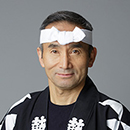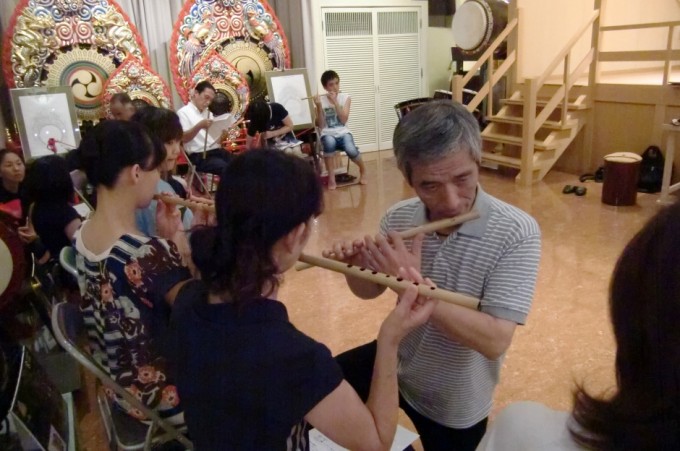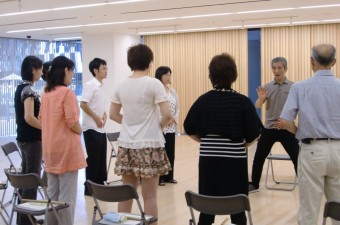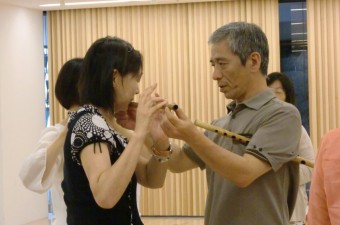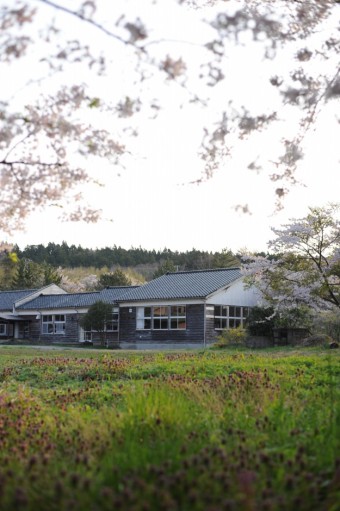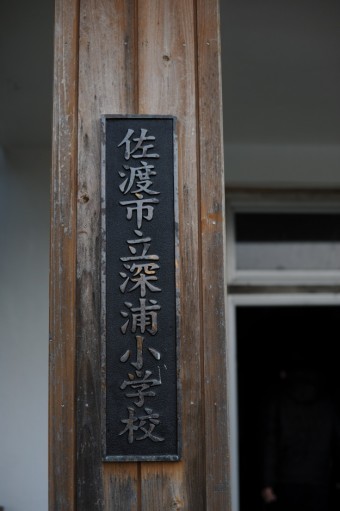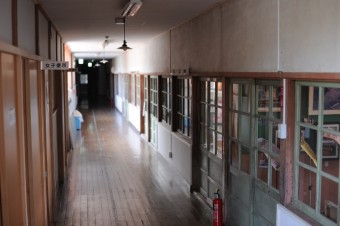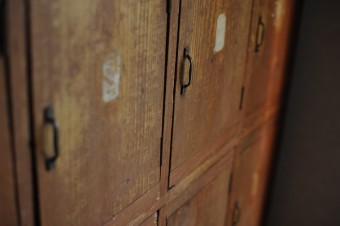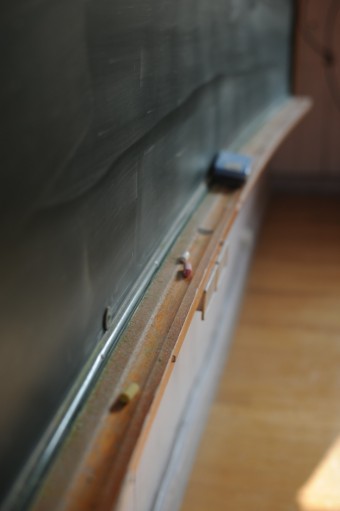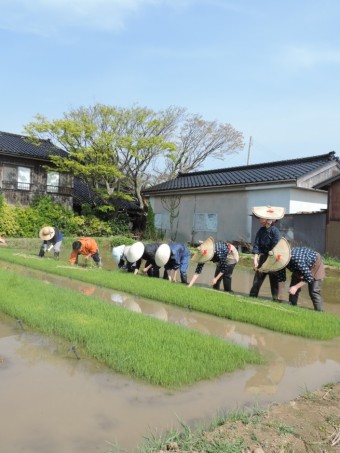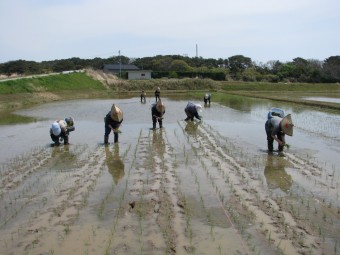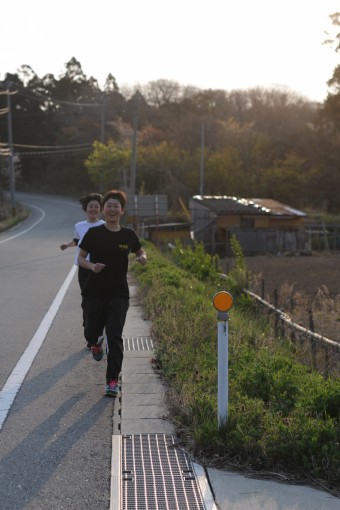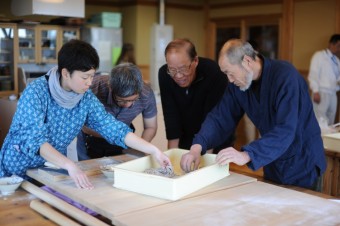Tag ‘Fukaura Gakusha (Fukaura Schoolhouse)’
“Kodo Juku at Fukaura Schoolhouse” by Yoshikazu Fujimoto
Kodo Cultural Foundation Project: “Kodo Juku at Fukaura Schoolhouse” Live-in Workshops
O-daiko & Ogi Matsuri Daiko with Yoshikazu Fujimoto
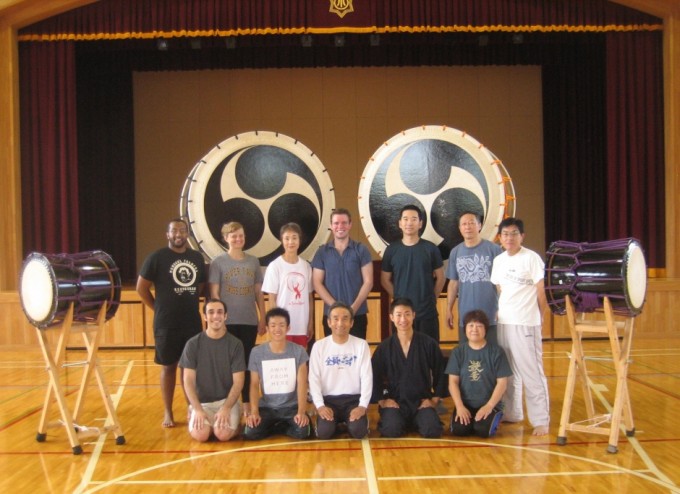
From Jul. 3 through 5, I led a “Kodo Juku at Fukaura Schoolhouse” live-in workshop for eleven participants. The group was made up of men and women of various ages from all over Japan, as well as four people from overseas who came along to play taiko for the first time. It was such a mixed bunch: the youngest participant was 17 and the eldest was 68 years old! We had four workshop sessions in all: Day 1 afternoon, Day 2 morning & afternoon, and Day 3 morning. I used these sessions to teach them O-daiko, where they face the drum and beat it, and Ogi Matsuri Daiko, where they drum standing side-on to the drum, plus a further two pieces. It was tough for them to learn all the different rhythms to play, but they all worked hard and managed to get through each piece. They came together as one, and I was so happy! I breathed a sigh of relief.
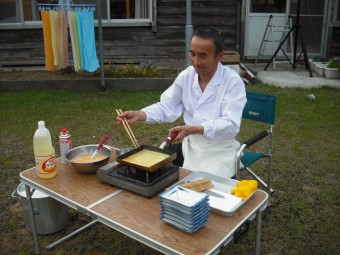
On the first day we had a BBQ outside, and I poured my heart and soul into making my specialty egg dish, dashi maki tamago, for them all to enjoy.
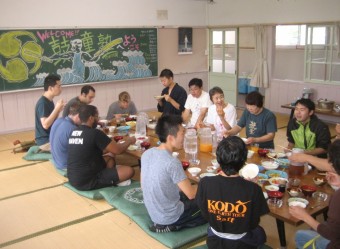
Lively breakfast together after our morning walk
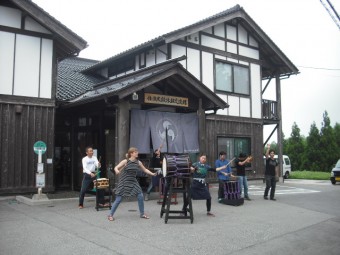
Kodo Cultural Foundation staff playing Ogi Matsuri Daiko in front of the Sado Island Taiko Centre to farewell the participants
“‘Kodo Juku at Fukaura Schoolhouse’ Live-In Workshops: Shinobue Camp Update!” by Tsugumi Yamanaka
May 29 (Fri)–31 (Sun), 2015
Shinobue (Bamboo Flute) with Motofumi Yamaguchi
This weekend, we look forward to welcoming participants to the first in our new series of 3-day live-in workshops at Fukaura Schoolhouse: Shinobue with Motofumi Yamaguchi. If you’d like to register last minute, please call us to confirm your place without delay!
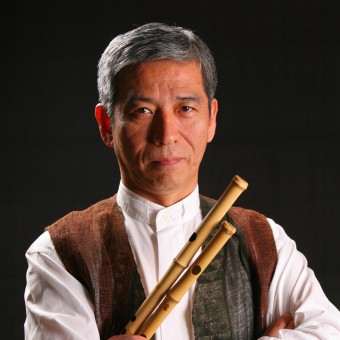 Message from Motofumi Yamaguchi
Message from Motofumi Yamaguchi
“Learning to play an instrument is similar to climbing a high mountain. Even if you work hard, taking one step at a time, it is not always easy to reach the top. But with each step you make upwards, you’ll encounter a brand new view.”
We’re looking forward to seeing everyone there.
Kodo Cultural Foundation Project: “Kodo Juku at Fukaura Schoolhouse” Live-In Workshops
http://www.kodo.or.jp/news/20150529kodojuku_en.html
“The Fukaura Schoolhouse” by Johnny Wales
Fukaura Gakusha – The Fukaura Schoolhouse
by Johnny Wales
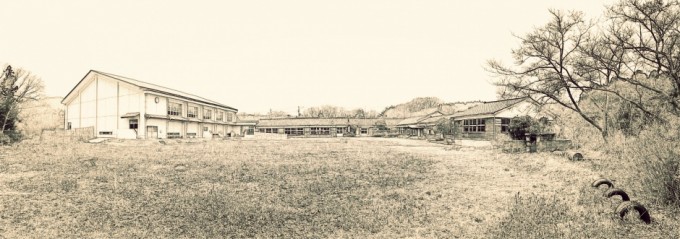
Welcome to Fukaura Gakusha (Fukaura Schoolhouse)
Not far from Kodo Village and perched high on the same ridge on Sado’s southern-most coast is the Fukaura Schoolhouse. This is where the first generation of Kodo members’ own children went to elementary and middle school, so it holds a special place in our hearts. Sadly, three years ago – as in so many other places in the Japanese countryside – it closed due to lack of young people to fill up its desks. Just a 15-minute walk down the road from the Sado Island Taiko Centre, a 15-minute drive from the port of Ogi, and 20 minutes to Sado’s largest sandy beach, this nostalgic wooden school in a grassy field is setting out on its second life. It will serve as a base for people coming to breath the air and experience first-hand what has made this magical island such a source of inspiration to us these forty years. Kodo’s dream has long been to not only bring the sights and sounds of Japan to the world but also to bring the world to Sado. We also want to do our part in giving back to the people of the island. Our busy lives here and on tour have meant that we haven’t been able to open Kodo Village to visitors except on special occasions. For those wanting to experience taiko here on the island the Sado Taiko Centre was built next to Kodo Village in 2007. There are no facilities for staying over though, so people were on their own when looking for a convenient place to stay. They say ‘When one door closes, another opens’, and so it is with the old Fukaura Schoolhouse. With the installation of modern bathrooms and conversion of some of the classrooms into dormitories with either tatami mats or bunk beds, we now have comfortable, if simple accommodations at a reasonable price for groups of up to 40 people, and it’s right down the road. Three meals a day are available featuring delicious home-made, seasonal, locally-sourced cuisine. A vegetarian or special dietary plan can also be arranged.

Inside Fukaura Gakusha (Fukaura Schoolhouse)
So if your group wants to experience the best of rural Japan – and while you are at it, drum your hearts out – here is the place to do it. Whether you are an experienced taiko group, have never even seen a Japanese drum and want to use a workshop as a team-building exercise, or you have a group of both veterans and beginners, one of Kodo’s veteran players can tailor a workshop to meet your needs.
“From Fukaura Gakusha (Fukaura Schoolhouse)” by Hirofumi Uenoyama
Fukaura Gakusha (Fukaura Schoolhouse)/ Trial First Year of the “Community Development Course”
This April, we launched our new “Community Development Course.” It offers the opportunity to learn from Sado’s nature and culture firsthand and uses those experiences to cultivate human resources who will activate local communities. For this first trial year, we have welcomed two trainees: Misaki Nakamura from Kiso, Nagano, and Misato Akazawa from Niigata City. The trainees are based at the former Fukaura Elementary School, which was renovated for a fresh start under the name “Fukaura Gakusha” (Fukaura Schoolhouse). The duo have begun their studies, which center on learning from locals about the area’s agricultural & fishing industries, festivals & traditional performing arts, preservation of historic architectural areas, culture and more.
The trainees produced a special Fukaura Gakusha unveiling event, held on April 20. They gained practical experience by planning and running the event, making fliers, and digging out memorabilia and photo albums that were left in the former school to display as a nostalgic exhibition on the day. The locals who joined us for the unveiling smiled as they reminisced about the school and relived various episodes from the past. It was a valuable experience for me to see firsthand the role this school had played in the region.
On May 4, the trainees took part in the “Kodo Special Performances on Sado Island” special event “Traditional Rice Planting,” under the guidance of master farmer Mr. Kenichiro Aoki. They experienced planting rice by hand in a traditional way using seedings from a semi-irrigated rice nursery. The trainees wore traditional work pants and bamboo hats and they worked very hard with other participants.
During the course of the year ahead, I would like to join the two trainees as they recognize and tackle local issues and problems. Through the trial and error, I hope that we can discover the real identity of “community development.”
The trainees’ reports are being shared on the Kodo Cultural Foundation Facebook page in Japanese. We hope you’ll take a look at their updates.
Kodo Cultural Foundation Facebook Page (in Japanese) https://www.facebook.com/KodoCulturalFoundation?fref=ts




